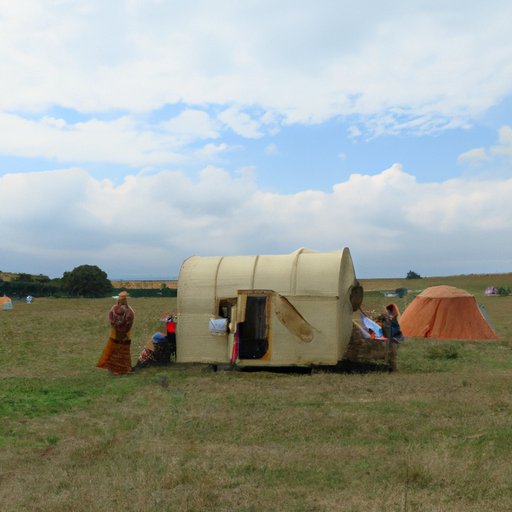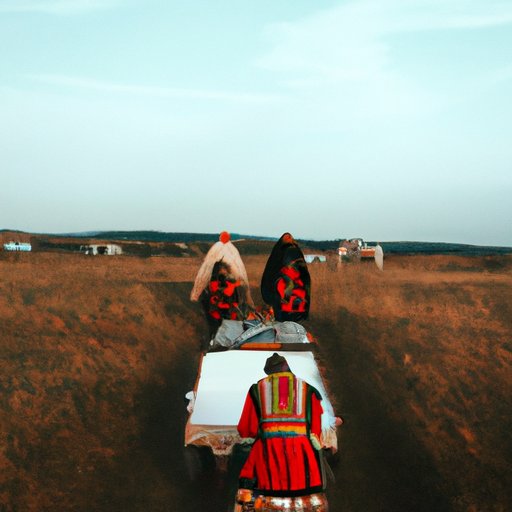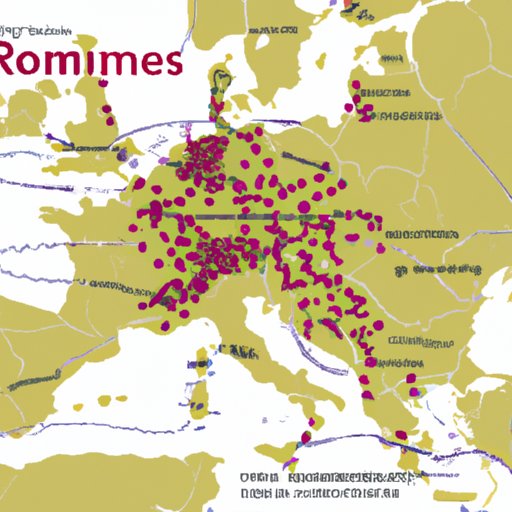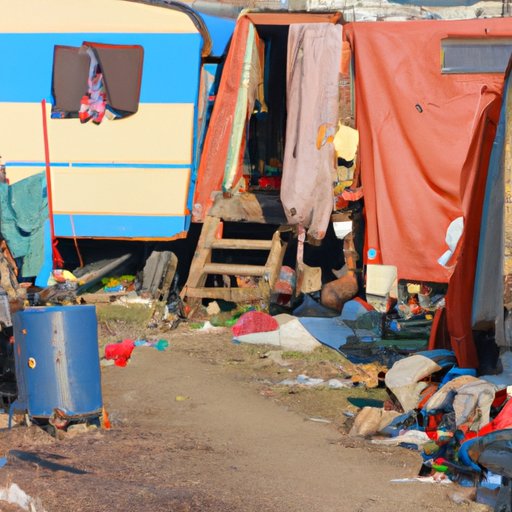Introduction
The Romani people, also known as Roma or Gypsies, are an ethnic minority group that has historically faced oppression and marginalization throughout Europe and beyond. The term “Romani” is derived from the Sanskrit word for “man” and refers to a distinct ethnic group with its own language, culture, and set of values. While their exact origin is disputed, much of the evidence suggests that the Romani people migrated from northern India in several waves beginning around the 11th century.
In this article, we will explore the history, culture, and migration patterns of the Romani people, as well as the challenges they face in terms of socio-economic status, political representation, and discrimination. We will also investigate the role of religion in the lives of Romani travellers and discuss how best to promote greater acceptance and understanding of this ethnic group.

History of Romani Travellers: Tracing the Origins of an Ethnic Group
The origin of the Romani people is a source of debate among historians and anthropologists. Some claim that the Romani people are descended from nomadic Indian tribes who migrated to Europe during the 11th century, while others argue that they are descendants of a variety of different ethnic groups from across Asia and the Middle East.
What is clear, however, is that the Romani people began migrating from northern India in several waves starting in the 11th century. These early migrants were likely fleeing persecution due to their nomadic lifestyle, which was seen as a threat to the agricultural societies of the time. As they spread across Europe, they encountered varying levels of acceptance and hostility, with some countries welcoming them while others viewed them as outsiders.
Over time, the Romani people developed a distinct culture, language, and set of values that set them apart from other ethnic groups. They also experienced periods of intense persecution, including the Holocaust, when hundreds of thousands of Romani people were killed by the Nazis.

Exploring the Cultural Traditions of Romani Travellers
The culture of the Romani people is unique and varied, with each group having its own customs, beliefs, and values. Music and art play a major role in Romani culture, particularly traditional folk music and dance. The Romani language is also distinct, with its own dialects and vocabulary.
Romani people are traditionally nomadic, living in small family groups and travelling from place to place in search of work and better living conditions. They often live in campsites on the outskirts of towns and villages, and many still follow a traditional lifestyle based on traditional values such as family, hospitality, and respect for elders.

Mapping the Migration Patterns of Romani Travellers
The Romani people have a long history of migration, with major waves of migration occurring over the centuries. After leaving India, they spread throughout Europe, settling in countries such as Germany, France, Italy, Spain, and the United Kingdom. In recent decades, there has been a new wave of migration as Romani people seek to escape poverty and persecution in their home countries.
Immigration policies have had a major impact on the migration patterns of Romani people. In some countries, such as the United Kingdom, Romani people have been denied access to basic services and subjected to discriminatory laws. This has led to an increase in the number of Romani people seeking refuge in other countries and has made it difficult for them to settle in one place.

A Closer Look at the Socioeconomic Status of Romani Travellers
Despite their long history in Europe, Romani people continue to face significant challenges in accessing basic services such as healthcare, education, and employment. Discrimination against Romani people is widespread, with many employers refusing to hire them and landlords refusing to rent to them. This has resulted in a cycle of poverty and social exclusion that is difficult to break.
The lack of access to basic services has also had a negative impact on the educational opportunities available to Romani children. Many schools are unwilling to accept Romani students and those that do often fail to provide adequate support and resources. This has resulted in a large gap in educational attainment between Romani and non-Romani children.
Examining the Political Struggles Faced by Romani Travellers
The Romani people have long been excluded from the political process, with few representatives in government or decision-making bodies. This has led to a lack of recognition of the rights and needs of Romani people, as well as a lack of understanding about the challenges they face. In recent years, however, there have been efforts to raise awareness about the plight of Romani people and to ensure that their voices are heard in the political process.
In addition, there have been various campaigns to secure civil rights for Romani people, including the right to equal access to public services and the right to vote. These efforts have been met with resistance in some countries, but they have made progress in raising awareness and challenging existing prejudices.
Investigating the Impact of Discrimination on Romani Travellers
Racism and prejudice against Romani people remain prevalent in many parts of Europe, with stereotypes and negative stereotypes perpetuated in the media and in society. This has had a damaging effect on the self-esteem of Romani people and has made it difficult for them to gain acceptance and respect from the wider community.
Discrimination against Romani people has also had a serious impact on their mental health, with higher rates of depression and anxiety among Romani people than among other ethnic groups. This is largely due to the lack of recognition and acceptance they experience in their day-to-day lives.
Understanding the Role of Religion in the Lives of Romani Travellers
Religion has played an important role in the lives of Romani people throughout history. Traditionally, most Romani people are Christian, although there is a great deal of religious diversity within the Romani community. In recent years, some Romani people have adopted Islamic beliefs, while others have embraced Paganism and other spiritual practices.
Religion plays an important role in Romani culture, providing comfort, guidance, and a sense of community for its adherents. It is also a source of strength and resilience in the face of discrimination and marginalization.
Conclusion
The Romani people are an ethnic group with a long and complex history. They have faced centuries of persecution and discrimination and continue to struggle against racism and prejudice today. Despite this, they have preserved their culture, language, and values and have fought for recognition and civil rights.
It is important to recognize the unique history and culture of the Romani people and to challenge the negative stereotypes that are perpetuated in society. By doing so, we can create a more inclusive and tolerant society where everyone is respected and valued regardless of their ethnicity or background.
(Note: Is this article not meeting your expectations? Do you have knowledge or insights to share? Unlock new opportunities and expand your reach by joining our authors team. Click Registration to join us and share your expertise with our readers.)
